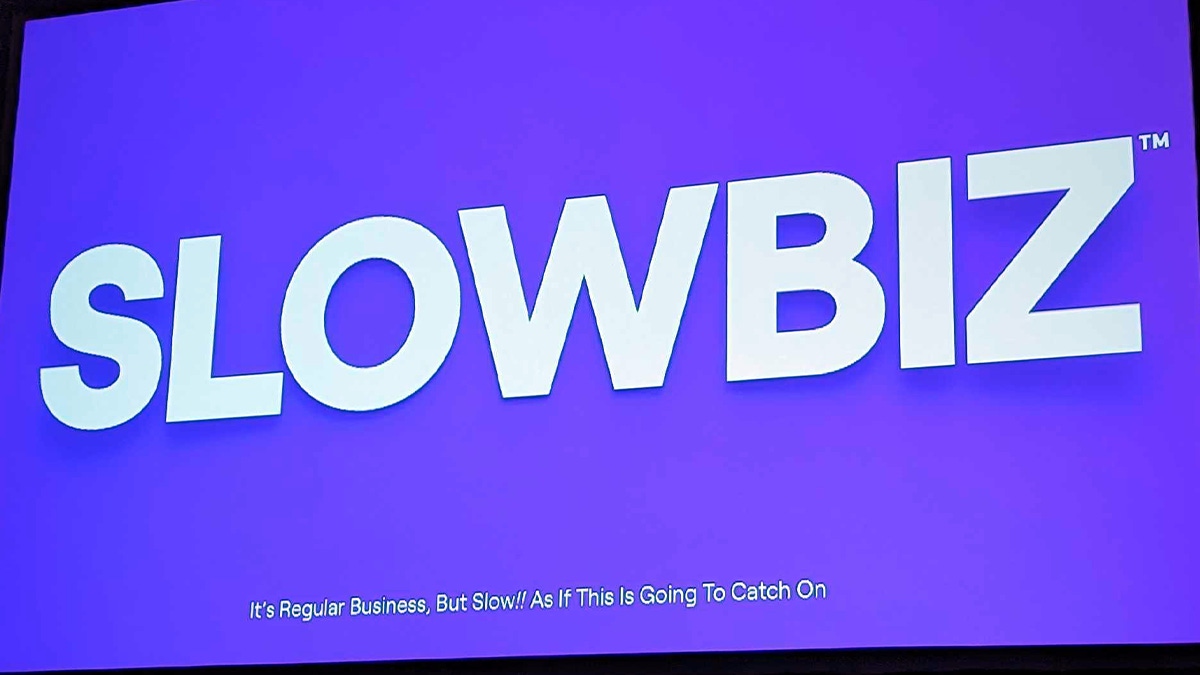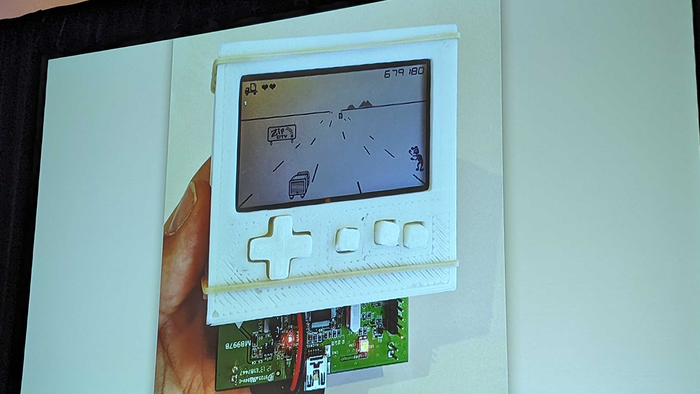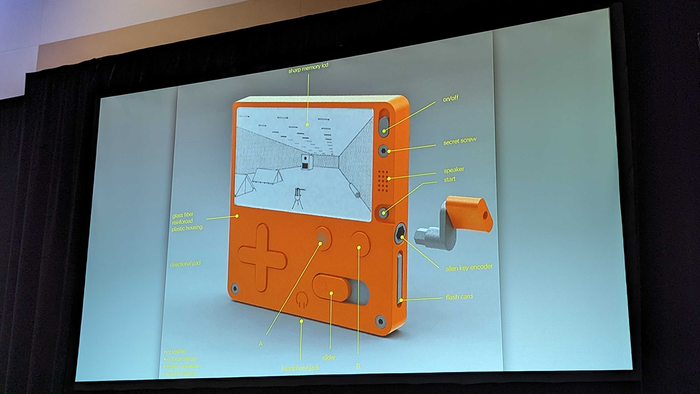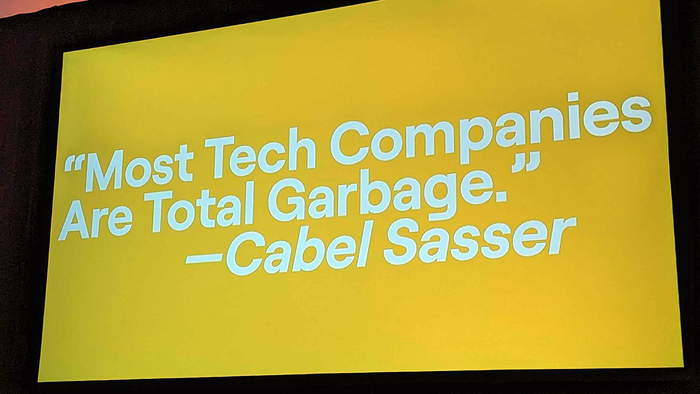Trending
Opinion: How will Project 2025 impact game developers?
The Heritage Foundation's manifesto for the possible next administration could do great harm to many, including large portions of the game development community.

Read More from GDC 2024 | Keep up with the latest game industry event coverage from GDC 2024, including news, talks, interviews, and more from the Game Developer team.
'We're a different kind of tech company. We're playing the long game.'

Playdate maker Panic isn't a startup, despite what you might think. The 30-person company has been around for 25 years but is often viewed as a fledgling go-getter that has just burst onto the scene.
During his GDC 2024 talk, Panic co-founder Cabel Sasser dissected the company's origins through the lens of Playdate, and posited that Panic is often billed as a startup because it practices something called "slowbiz."
"Let me explain what that means. We're a different kind of tech company. We're playing the long game. We gradually level up year after year. We never had investors. We never had shareholders. I think when you have shareholders, they're kind of used as a scapegoat for your bad decisions," he says.
"We have no one to scapegoat. Every decision falls on us. We never took any seed money. In the real world of business, this is actually pretty normal—like [if you were running] a hardware store or laundromat or whatever. But for some reason in tech, it's very unusual. And that's why people call us a startup."
After cutting its teeth making Mac applications, Panic eventually went through what Sasser describes as a "mid-corporate life crisis" and set out to answer the question "is there more we could be doing?" The end result was (in part) Playdate, the little yellow handheld (with a crank!) that has now sold over 70,000 units worldwide.
In his talk, Sasser explains that turning the Playdate into a viable piece of hardware required Panic to overcome challenge after challenge, with manufacturers and shipping companies pulling the rug out from under them on multiple occasions and a catastrophic battery debacle derailing the entire operation during its infancy. At that stage, Sasser would've thrown in the towel had it not been for some wise words from his son.
He explains that bringing Playdate to life really did take a village, but it was also helped along by the company's "slowbiz" connections. After iterating on the concept internally and building some mock-ups of its own with the help of veteran engineer Dave Hayden, who oversaw what Sasser calls internal "Dave Tests," the company eventually created a working prototype that kinda-sorta made good on its pitch of bringing the Game & Watch into the modern age.

An early Playdate prototype created by Panic
Around that time, Panic met with the CEO of a local design firm who told them it would take roughly $1 million to develop the product. Sasser initially laughed off that figure, but now suggests it might have been closer to the mark than he'd care to admit. Demoralized but undeterred, Panic got in touch with a company called Teenage Engineering, which would eventually go on to design the Playdate's iconic visage.
"We emailed [Teenage Engineering] out of the blue and they emailed back very quickly. Amazingly, they were like 'oh, we love Transmit.'" Transmit is a macOS file transfer app developed and iterated on by Panic over decades. It couldn't be more different to the project they pitched at Teenage Engineering, but it gave the company a way in.
"There's a lot of things about slowbiz where you do something in one place and because you're playing the long game that pays off in an incredible way later on down the road," continues Sasser. "I feel like when you're in a rush to make the most amount of money as quickly as possible and blow up and all that stuff, you don't get to enjoy those kinds of connections. It's really interesting."
Teenage Engineering started making a bunch of cool cases, including an orange showstopper that gives the yellow finish (inspired by the Famicom Disk System) a run for its money, and eventually introduced Panic to the concept of the crank. Sasser says the collaboration sent the company into "turbo excitement mode" and was fundamental in birthing the Playdate as we know it today.

An orange Playdate concept created by Teenage Engineering
Yet, there was another issue. Although Panic had accumulated plenty of goodwill as a software maker, it had absolutely no clout in the world of hardware. Sure, having the backing of a company like Teenage Engineering might help, but after debuting Playdate on the cover of Edge in 2018 the company set about rebuilding its reputation from scratch to differentiate itself from the "garbage" tech companies that have taught consumers to expect a "constant barrage of technological disappointment all the time."
"I think every company basically has a karma bar right? And you can't just say out loud 'hey, trust us!' because that's what garbage companies do," says Sasser. "There's no shortcut to this. There's no shortcut to building goodwill. We had to rebuild our capital again year by year, and we'll have to do it for literal decades to show people that we're doing the best we can, and we're making the right decisions.
"With this karma bar, something's gonna pop up and you're gonna get some noise, and you're not going to get everything right. That karma bar is going to go down a little bit, and then you're gonna have to work hard to correct it and get back up."

Cabel gets real at GDC 2024
Panic continues to engage with console owners and devs to ensure Playdate meets their shifting needs after turning the device from a slice of quirky hardware into a full-blown platform, but with the wider game industry coming apart at the seams due to overspending, investor bootlicking, and trend chasing, I can't help but wonder if the word "slowbiz" should perhaps be put up in lights.
Game Developer and GDC are sibling organizations under Informa Tech.
You May Also Like